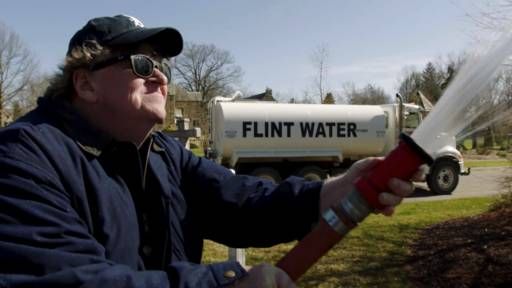Click here to subscribe today or Login.
I know that a good chunk of our readers would never consider seeing a Michael Moore film, though some of them will probably decide to comment on this column (without actually reading it) just out of the viscerally angry reaction Moore tends to provoke.
They’re not alone.
When I plunked down $9.50 to see “Fahrenheit 11/9” on Saturday night, there were barely a dozen other moviegoers in the theater around me.
Nationwide, the feeling seemed to be mutual.
Moore’s new film, which examines the rise of Donald Trump and other developments like the water crisis in his hometown of Flint, Michigan, had been predicted to open with $5 million to $8 million, the Associated Press reported.
Its title refers to Nov. 9, 2016, the date on which Donald Trump claimed victory in that year’s presidential election. It’s also a self-aggrandizing homage to Moore’s “Fahrenheit 9/11.”
Moore’s latest effort opened with $3.1 million in 1,719 cinemas, the AP added — a huge debut for most documentaries but a fraction of the $23.9 million opening generated in 2004 by Moore’s record-breaking “Fahrenheit 9/11.” That film went on to make $222.4 million worldwide, a record for documentaries.
As Moore put it in the film, “How the f— did this happen?”
He answered his own question elsewhere: “We know all this!”
Indeed, political fatigue — fed by the rise of social media and an increasingly intense cable TV landscape in the 14 years since “Fahrenheit 9/11” came out — could have kept many who might be interested in Moore’s perspective away.
Prospective viewers who weren’t automatically turned off because they love Trump or hate Moore (often both), might have decided that they can log onto Facebook if they want to see the president compared with Hitler.
Moore is often his own worst enemy.
The sequence in which audio from a Trump rally is superimposed over 1930s footage of Hitler wildly gesticulating to enraptured brown-shirts at Nuremberg was one of several over-the-top scenes.
Then there was the stunt in which Moore drove a truck theatrically labeled “Flint Water” up to the Michigan governor’s residence and aimed a hose over the gates.
And Moore’s innuendos about Trump’s attraction to daughter Ivanka, while grounded in gross remarks made by the president himself, were disgusting and gratuitous.
Moore’s heavy-handed approach harms his credibility and too often distracts from the important story he is trying to tell.
More compelling and honest were the scenes in which Moore spoke with people who lost relatives to ailments connected with Flint’s tainted water, student survivors of the Parkland school shootings, or West Virginia teachers who staged successful strikes for higher wages and an end to an oppressive health insurance policy requiring them to wear exercise tracking devices to qualify for coverage.
What do all of these people have to do with Donald Trump? Sometimes nothing, at least not directly.
Unlike “Fahrenheit 9/11,” which was a scathing indictment of the Bush administration and the road from Sept. 11 to Afghanistan and Iraq, its quasi-sequel is more than an anti-Trump tirade.
Rather, Moore here is saying the entire American political system is irretrievably broken, heaping plenty of blame on the Democratic Party establishment — and both Clintons — with several gut-punches reserved for Barack Obama.
Put aside the Nazi rally porn and melodramatic scenes of the German Reichstag burning as “Deutschland Über Alles” plays in the background, and yes, Moore makes a compelling case the threat of fascism in America is real.
He makes that case speaking with constitutional scholars and historians who succinctly remind us the lesson that Germans learned painfully in the 1930s: The constitution won’t protect vulnerable minorities — it won’t protect any of us — in the hands of a president who continues to ignore its precedents with the slavish acquiescence of a corrupt legislature.
Nor will it protect us from greedy and amoral corporations, whose money buys and sells politicians, resulting — as Moore most successfully argues — in environmental and economic tragedies like those that have befallen his beloved Flint.
How did this happen? Feeling disenfranchised by one or both parties, an estimated 100 million eligible Americans chose not to vote in 2016, as Moore reminds us.
All that could save us, Moore suggests, is the rise of empowered citizens who vote, organize, challenge the political establishment, even run for office.
Save yourself the $9.50. Wait for Netflix if anything about Moore’s flick appeals to you.
Just turn out in November.





